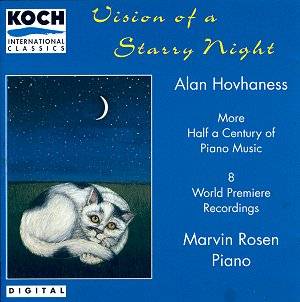Alan HOVHANESS (1911-2000)
Vision of a Starry Night
Piano Music:-
Vision of a Starry Night from Sonata Ananda
Op. 303 (1977)
Mystic Flute Op. 22 (1937)
Toccata and Fugue No. 1 Op. 6 No. 1 (1935 rev 1970)
Mountain Idylls Op. 52 No. 4-6 (1953, 1949, 1932)
Prelude and Fugue Op. 10 No. 1 (1935)
Do You Remember the Last Silence (1957)
Lousang Kisher (Moonlight Night) Op. 52a (1943)
Suite Op. 96 (1967)
Fire Dance (c. 1926)
Farewell to the Mountains (1945)
Hymn IV from Bare November Day Op. 210 (1964)
Two Ghazals Op. 36 (1963)
Madras Sonata Op. 176 (1946 rev 1960)
Sonata Op. 145 (1956)
 Marvin Rosen (piano) Marvin Rosen (piano)
DDD rec 6 Apr 1994, Mastersound Astoria Studios, Astoria, New York
 KOCH International
Classics 3-7288-2H1
[68.15] KOCH International
Classics 3-7288-2H1
[68.15]
Crotchet AmazonUK
AmazonUS |
 |
The title movement from Ananda is suffused with sing-song,
sampler, sepia-toned grace. It holds hands with some of the sentimental moods
from Godowsky's Java Suite (a work beautifully recorded by Esther
Budiardjo and not to be missed). Mystic Flute inhabits a fragile
and bluff world drifting from robust Holstian dance essay into courtly dignity
- not at all the narcissistic solipsism I had expected from the title. The
steady sixteenth note pattern holds firm throughout the Toccata
of the Op. 6 work and the fugue powers away in interleaved dance
patterns. The 1935 Prelude and Fugue is very grand and fuses
Bach with Reger in its heaviness with portent. Blissful ecstatic excitement
also courses through the veins of the Fugue.
After such structured patterning the three Mountain Idylls
numbers 4 and 6 (both largos) are mystic lullabies. They encase a
childlike joy and innocence in the momentary Moon Dance. Lousang
Kisher is a further moon picture with a fast sauntering melody pinned
to earth by a drum patterned left-hand part. An altogether more grown-up
darkness infuses the Do You Remember the Last Silence. This
pictures the deep silence and nothingness before the universe was created.
The Suite has also been recorded by Sahan Arzruni on Hearts
of Sound with, I think, a shade more fluency than Marvin Rosen; not that
there is anything seriously amiss and indeed his Mysterious Temple
final movement is every bit as dreamlike as Arzruni. This movement is
the modernistic Hovhaness - the same composer whose challenge is thrown down
in the Vishnu Symphony and in Mountains and Rivers Without End
(both available on Crystal Records).
Chopin and Prokofiev lilt and bow to each other in Fire Dance -
a work with humour as well as spirit. Farewell to the Mountains
is another of those works where the composer sends his strange
quick-pulsing rhythms flying off and skittering to the four winds. The piece
is dedicated to his cat, Rajah Hayden. It uses oud sounds and unusual time
signatures to create its effect. Hymn IV is extracted from
the six movement suite Bare November Day. This is a meditative
hymn such as might have lain under the fingers of Vaughan Willimas or Herbert
Howells in his Lambert's Clavichord.
Arzruni also recorded the Two Ghazals though this time there
is little to choose between the interpretations. The dark and seraphic music
was also used in Floating World (for orchestra) in 1964. It is a
recognisable fingerprint of this composer that he places forbidding atonal
passages alongside graceful melodies, dances and water evocations. The 10
minute Madras Sonata is amongst his earliest piano sonatas
if not the very first. It was written in 1946 and revised in 1960. It is
called Madras because it was commissioned by the Madras Academy of
Music. It is a work of only tangentially exotic spirit - what we get is an
almost sentimental blend of Bach and Rachmaninov (try track 22 1.43).
The Op. 145 Piano Sonata is more exotic and by no means as dissonant
as the Ghazals although we soon come to recognise that dissonance (usually
gentle and sphinx-like) are part of this composer's stock-in-trade.
Supportive detailed notes written by the pianist.
Rob Barnett

